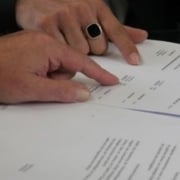Increased FCPA enforcement may lead to more foreign language document reviews for attorneys
The Foreign Corrupt Practices Act (FCPA) is likely to provide more foreign language document reviews for attorneys and translators during the new presidential administration because U.S. Attorney General Jeff Sessions said during a speech this month that the Justice Department would continue to prosecute corporate fraud. He added that “one area where this is critical is enforcement of the Foreign Corrupt Practices Act.”
What is the FCPA?
The Foreign Corrupt Practices Act is the primary legislation the Justice Department uses as the standard to determine an international corporation’s compliance and is designed to enforce transparency in corporate reports to the Securities and Exchange Commission and to combat bribery of foreign officials. It has provided a growing source of document reviews, typically using attorneys who speak foreign languages, and is sometimes ordered by judges before major trials in recent years. The reviews typically consist of assigning attorneys to read emails, contracts, financial statements and other internal documents of an organization and to flag any information hinting at criminal or civil wrongdoing using specialized software.
The scope of the Foreign Corrupt Practices Act is broad, covering the business activities of nearly anyone associated with the United States who engages in international trade. Part of the political motivation for the Foreign Corrupt Practices Act resulted from a mid-1970s Securities and Exchange Commission investigation. It found that more than 400 U.S. companies admitted to making payments totaling more than $300 million to foreign government officials or political parties to advance their business interests. They included direct bribes for high-ranking foreign officials to “facilitating payments” to ensure lower-level ministers or clerks carry out their duties. The most controversial change was the 1998 amendment, in which Congress extended the scope of the law beyond U.S. borders and authorized prosecutions of foreign citizens. Foreign governments and business owners complained that the U.S. government might intrude into their domestic affairs with such a broad authorization. They also worried that the fines could seriously hurt their international trade.
How do recent FCPA events lead to more document review?
Document review contributed to the successful prosecution of foreign businesses Some of the more high-profile prosecutions include:
2017: The Justice Department and Securities and Exchange Commission charged Sociedad Quimica y Minera de Chile, S.A., a Chilean mining and chemical company, with violating federal law. The company, which holds U.S. securities, allegedly earned more than $14 million after bribing Chilean politicians and political candidates.
2014: ALCOA was forced to relinquish $175 million in revenue and fined $209 million after its Australian mining subsidiary hired an agent to bribe officials in Bahrain to win a bauxite ore supply contract.
2012: The Japanese firm Marubeni Corp. paid a $54.6 million fine for allegedly acting as the agent of an international joint venture that won four Nigerian government contracts worth more than $6 billion. The joint venture won the contracts after paying Marubeni Corp. $51 million to bribe Nigerian government officials.
2008: Siemens AG paid a $450 million fine after being prosecuted for a Foreign Corrupt Practices Act violation. It is one of the largest fines in the history of the federal law.
Why is Document Review Important?
Before the turn of the century, the evidence gathered for the prosecutions would have consisted largely of witness testimony and papers seized from file cabinets. The Internet and electronic discovery have vastly expanded the reach of document review. Attorneys can now monitor each email, draft document and receipt that could play a role in an investigation. The investigations also can stretch far beyond U.S. borders to any corner of the world served by the Internet. As a result, federal court have been ordering document reviews at an increasing rate in Foreign Corrupt Practices Act investigations.
Need help with your legal document reviews? Give us a call at 1.312.263.3379 or complete this form and learn how we can help.










